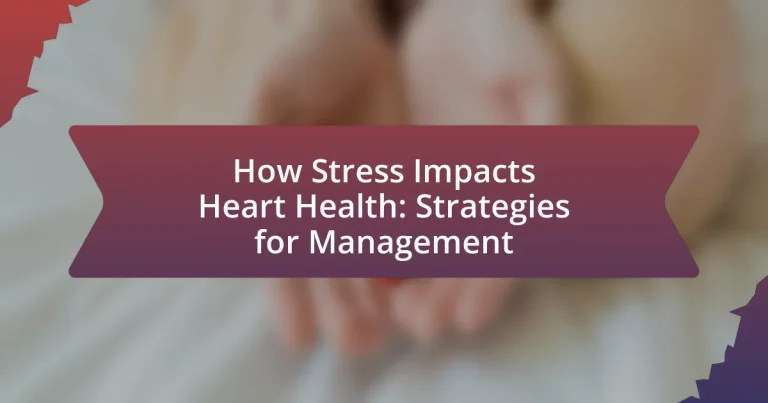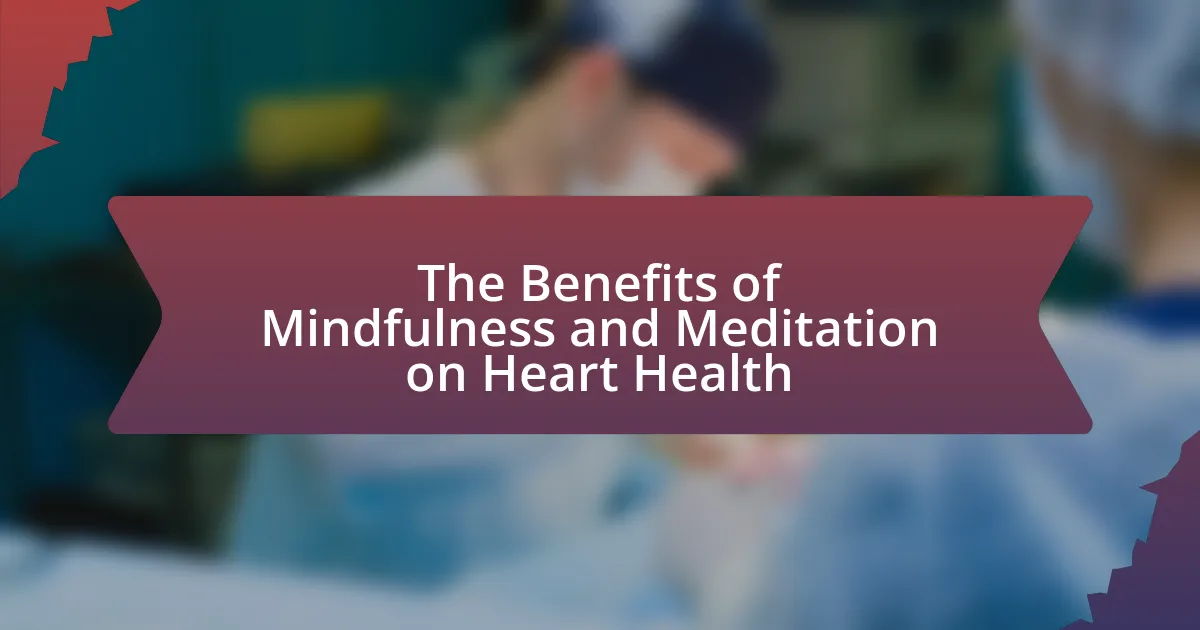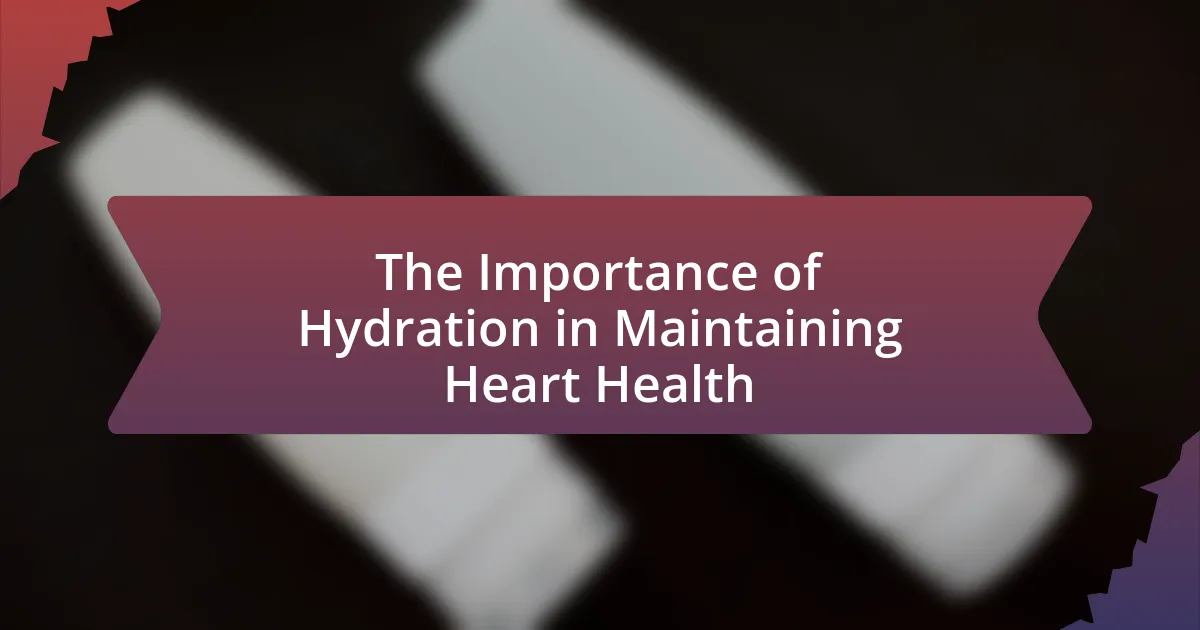The article focuses on the impact of stress on heart health, detailing how stress increases blood pressure and heart rate, leading to cardiovascular diseases. It explains the physiological effects of stress hormones like cortisol and adrenaline, which contribute to long-term heart health issues such as hypertension and heart disease. The article also highlights the role of chronic stress in promoting unhealthy behaviors that further exacerbate cardiovascular risks. Additionally, it provides strategies for managing stress, including physical activity, mindfulness practices, and social support, emphasizing their importance in maintaining heart health.
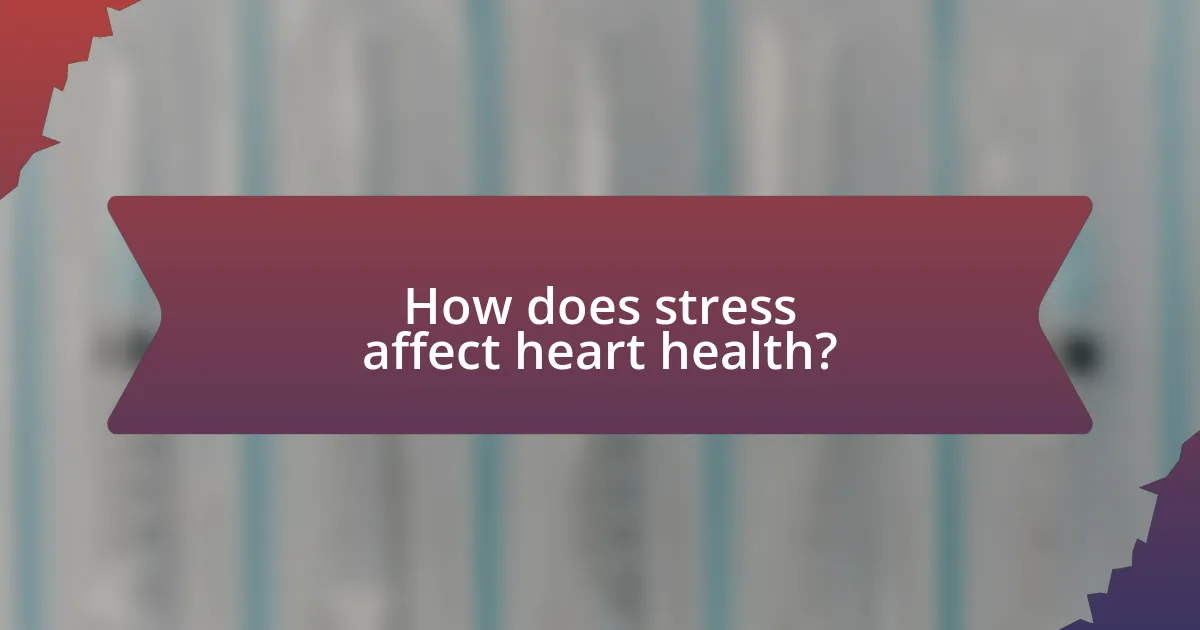
How does stress affect heart health?
Stress negatively impacts heart health by increasing blood pressure and heart rate, which can lead to cardiovascular diseases. When an individual experiences stress, the body releases hormones such as adrenaline and cortisol, which prepare the body for a ‘fight or flight’ response. This physiological reaction can cause the heart to work harder, resulting in elevated blood pressure. According to the American Heart Association, chronic stress is linked to inflammation in the coronary arteries, contributing to the development of heart disease. Additionally, stress can lead to unhealthy behaviors such as poor diet, lack of exercise, and smoking, further exacerbating heart health issues.
What are the physiological effects of stress on the heart?
Stress has significant physiological effects on the heart, primarily increasing heart rate and blood pressure. When an individual experiences stress, the body releases stress hormones such as adrenaline and cortisol, which stimulate the heart to beat faster and constrict blood vessels, leading to elevated blood pressure. Chronic stress can contribute to long-term cardiovascular issues, including hypertension, increased risk of heart attack, and heart disease. Research indicates that individuals with high stress levels are more likely to develop these conditions, as evidenced by a study published in the Journal of the American College of Cardiology, which found that stress is a major risk factor for cardiovascular events.
How does stress lead to increased heart rate and blood pressure?
Stress leads to increased heart rate and blood pressure primarily through the activation of the body’s fight-or-flight response. When an individual experiences stress, the brain signals the adrenal glands to release hormones such as adrenaline and cortisol. These hormones increase heart rate by stimulating the heart and constricting blood vessels, which raises blood pressure. Research indicates that chronic stress can lead to sustained elevations in these hormones, resulting in long-term cardiovascular issues. For instance, a study published in the Journal of the American College of Cardiology found that individuals with high stress levels had a significantly higher risk of hypertension and heart disease, demonstrating the direct link between stress and cardiovascular health.
What role do stress hormones play in heart health?
Stress hormones, primarily cortisol and adrenaline, significantly impact heart health by increasing heart rate and blood pressure, which can lead to cardiovascular issues. Elevated levels of these hormones during chronic stress can contribute to inflammation, arterial damage, and the development of atherosclerosis. Research indicates that prolonged exposure to stress hormones can increase the risk of heart disease, as evidenced by a study published in the Journal of the American College of Cardiology, which found that individuals with high cortisol levels had a greater incidence of coronary artery disease. Thus, managing stress effectively is crucial for maintaining heart health.
Why is chronic stress particularly harmful to the heart?
Chronic stress is particularly harmful to the heart because it leads to prolonged exposure to stress hormones like cortisol, which can increase heart rate and blood pressure. This sustained elevation in heart rate and blood pressure can contribute to the development of cardiovascular diseases, including hypertension, heart attacks, and strokes. Research indicates that individuals experiencing chronic stress are at a significantly higher risk for these conditions; for instance, a study published in the Journal of the American College of Cardiology found that chronic stress is associated with a 40% increased risk of heart disease.
What are the long-term consequences of chronic stress on cardiovascular health?
Chronic stress has significant long-term consequences on cardiovascular health, including increased risk of hypertension, heart disease, and stroke. Prolonged exposure to stress hormones like cortisol can lead to inflammation, arterial damage, and changes in heart rate and blood pressure regulation. Research indicates that individuals experiencing chronic stress are 40% more likely to develop heart disease compared to those with lower stress levels, as shown in a study published in the Journal of the American College of Cardiology. Additionally, chronic stress can contribute to unhealthy behaviors such as poor diet, smoking, and physical inactivity, further exacerbating cardiovascular risks.
How does chronic stress contribute to heart disease risk factors?
Chronic stress significantly contributes to heart disease risk factors by increasing levels of cortisol and adrenaline, which can lead to hypertension and elevated heart rate. Prolonged exposure to these stress hormones can result in inflammation and damage to blood vessels, promoting atherosclerosis. Additionally, chronic stress often leads to unhealthy behaviors such as poor diet, physical inactivity, and smoking, which further exacerbate heart disease risk. Research indicates that individuals experiencing chronic stress have a 27% higher risk of developing heart disease compared to those with lower stress levels, highlighting the critical link between stress and cardiovascular health.
What are the signs that stress is impacting heart health?
Signs that stress is impacting heart health include increased heart rate, elevated blood pressure, and the presence of chest pain or discomfort. Chronic stress triggers the release of stress hormones like cortisol and adrenaline, which can lead to these cardiovascular symptoms. Research indicates that prolonged exposure to stress can contribute to heart disease by promoting inflammation and increasing the risk of atherosclerosis, as noted in studies published in the Journal of the American College of Cardiology.
How can individuals recognize stress-related heart symptoms?
Individuals can recognize stress-related heart symptoms by identifying signs such as chest pain, rapid heartbeat, shortness of breath, and fatigue. These symptoms often arise during periods of heightened stress and can indicate that the heart is responding to emotional or psychological strain. Research shows that chronic stress can lead to increased heart rate and blood pressure, which may manifest as these physical symptoms. Recognizing these indicators is crucial for individuals to seek timely medical advice and manage their stress effectively.
What are the psychological indicators of stress affecting heart health?
Psychological indicators of stress affecting heart health include anxiety, depression, and chronic anger. Anxiety can lead to increased heart rate and blood pressure, which are risk factors for heart disease. Depression is associated with inflammation and changes in heart function, contributing to cardiovascular issues. Chronic anger can trigger the body’s stress response, resulting in elevated cortisol levels that negatively impact heart health. Studies have shown that individuals with high levels of anxiety and depression are at a greater risk for heart disease, highlighting the importance of addressing these psychological factors in managing heart health.
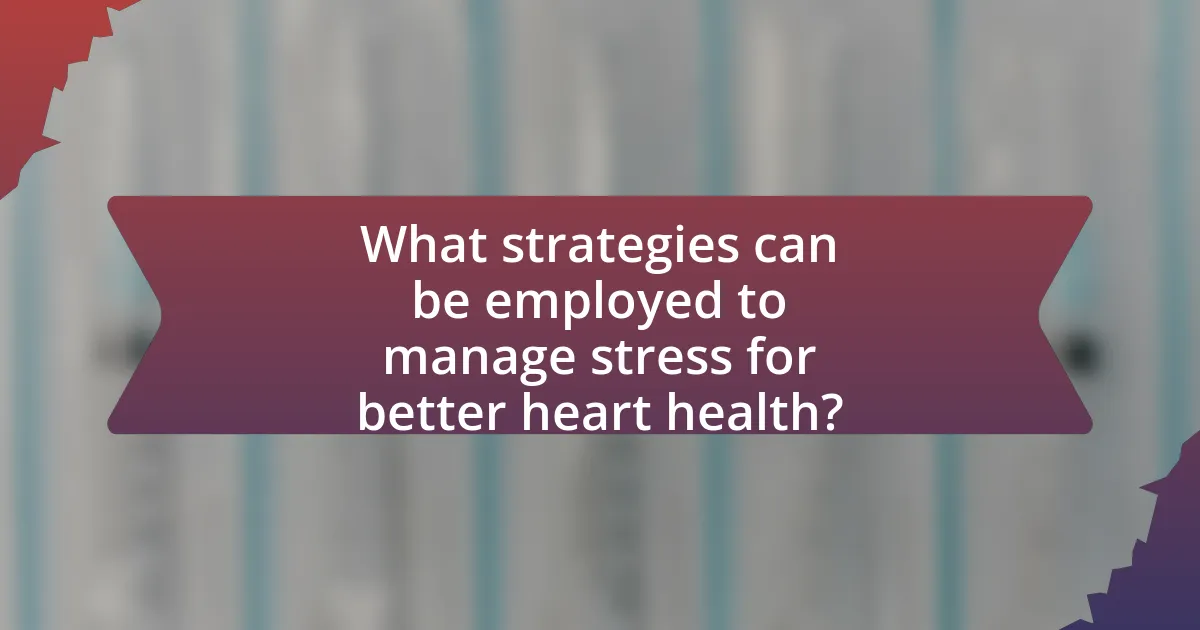
What strategies can be employed to manage stress for better heart health?
To manage stress for better heart health, individuals can employ strategies such as regular physical activity, mindfulness meditation, and social support. Engaging in regular exercise has been shown to reduce stress hormones and improve mood, which directly benefits heart health. Mindfulness meditation can lower blood pressure and reduce anxiety, contributing to a healthier cardiovascular system. Additionally, maintaining strong social connections provides emotional support, which is crucial for managing stress effectively. Research indicates that individuals with robust social networks experience lower levels of stress and better heart health outcomes, as evidenced by a study published in the Journal of the American College of Cardiology, which found that social support significantly correlates with reduced cardiovascular risk.
How can lifestyle changes reduce stress levels?
Lifestyle changes can significantly reduce stress levels by promoting healthier habits and improving overall well-being. Engaging in regular physical activity, such as aerobic exercises, has been shown to lower stress hormones like cortisol and increase endorphins, which enhance mood. Additionally, adopting a balanced diet rich in fruits, vegetables, and whole grains can improve brain function and emotional resilience, further mitigating stress.
Practices such as mindfulness meditation and yoga have been scientifically validated to reduce anxiety and stress, as they encourage relaxation and present-moment awareness. A study published in the Journal of Clinical Psychology found that mindfulness-based stress reduction techniques can lead to significant decreases in stress levels among participants.
Furthermore, establishing a consistent sleep schedule and ensuring adequate rest can enhance cognitive function and emotional regulation, thereby reducing stress. According to the National Sleep Foundation, insufficient sleep is linked to increased stress and anxiety levels.
In summary, lifestyle changes such as regular exercise, a nutritious diet, mindfulness practices, and proper sleep can effectively lower stress levels, supported by various studies and health organizations.
What role does physical activity play in stress management?
Physical activity plays a crucial role in stress management by reducing levels of stress hormones and promoting the release of endorphins, which are natural mood lifters. Engaging in regular exercise has been shown to decrease anxiety and improve overall mental well-being. For instance, a study published in the Journal of Clinical Psychiatry found that individuals who participated in regular physical activity reported lower levels of stress and anxiety compared to sedentary individuals. This evidence supports the conclusion that physical activity is an effective strategy for managing stress and enhancing heart health.
How can nutrition impact stress and heart health?
Nutrition significantly impacts stress and heart health by influencing physiological responses and overall well-being. A balanced diet rich in fruits, vegetables, whole grains, and healthy fats can reduce inflammation and improve heart function, while also stabilizing mood and reducing stress levels. For instance, omega-3 fatty acids found in fish have been shown to lower cortisol levels, a hormone associated with stress, and improve cardiovascular health by reducing triglycerides and blood pressure. Additionally, a study published in the Journal of the American College of Cardiology found that individuals who consume a Mediterranean diet, which emphasizes plant-based foods and healthy fats, experience lower levels of stress and a reduced risk of heart disease. Thus, proper nutrition serves as a crucial factor in managing both stress and heart health.
What relaxation techniques are effective for stress reduction?
Effective relaxation techniques for stress reduction include deep breathing exercises, progressive muscle relaxation, mindfulness meditation, and yoga. Deep breathing exercises help lower heart rate and reduce anxiety by promoting oxygen flow and calming the nervous system. Progressive muscle relaxation involves tensing and then relaxing different muscle groups, which can alleviate physical tension associated with stress. Mindfulness meditation encourages individuals to focus on the present moment, reducing rumination and enhancing emotional regulation. Yoga combines physical postures, breathing techniques, and meditation, which has been shown to decrease cortisol levels and improve overall well-being. Research indicates that these techniques can significantly lower stress levels and improve heart health by reducing the physiological effects of stress on the body.
How does mindfulness and meditation benefit heart health?
Mindfulness and meditation benefit heart health by reducing stress and lowering blood pressure. Research indicates that regular practice of mindfulness can lead to significant reductions in stress hormones, such as cortisol, which are linked to heart disease. A study published in the Journal of the American College of Cardiology found that participants who engaged in mindfulness meditation experienced a 10% reduction in blood pressure compared to those who did not practice meditation. Additionally, mindfulness practices improve emotional regulation and promote a healthier lifestyle, further contributing to cardiovascular health.
What are the benefits of deep breathing exercises for stress relief?
Deep breathing exercises provide significant benefits for stress relief by activating the body’s relaxation response, which reduces stress hormones and promotes a sense of calm. Research indicates that deep breathing can lower heart rate and blood pressure, contributing to improved cardiovascular health. A study published in the Journal of Clinical Psychology found that participants who practiced deep breathing techniques reported a 30% reduction in perceived stress levels. Additionally, deep breathing enhances oxygen flow to the brain, improving mental clarity and emotional regulation, which further aids in managing stress effectively.
How can social support systems help in managing stress?
Social support systems can significantly help in managing stress by providing emotional, informational, and practical assistance. Research indicates that individuals with strong social networks experience lower levels of stress and better overall health outcomes. For instance, a study published in the Journal of Health and Social Behavior found that social support is linked to reduced physiological stress responses, such as lower cortisol levels, which are associated with heart health. Additionally, supportive relationships can enhance coping strategies, allowing individuals to navigate stressful situations more effectively, thereby mitigating the negative impacts of stress on heart health.
What types of social interactions are most beneficial for stress relief?
Positive social interactions, such as spending time with friends and family, engaging in group activities, and participating in supportive community events, are most beneficial for stress relief. These interactions foster emotional support, enhance feelings of belonging, and promote relaxation, which can significantly lower stress levels. Research indicates that social support can reduce the physiological effects of stress, as evidenced by a study published in the journal “Health Psychology,” which found that individuals with strong social networks experience lower levels of cortisol, a stress hormone. Additionally, engaging in laughter and shared experiences during social gatherings has been shown to release endorphins, further alleviating stress.
How can community involvement reduce stress levels?
Community involvement can reduce stress levels by fostering social connections and providing a sense of belonging. Engaging with others in community activities promotes emotional support, which has been shown to lower anxiety and depression rates. Research indicates that individuals who participate in community service report higher levels of life satisfaction and lower stress levels, as social interactions can release oxytocin, a hormone that reduces stress. Additionally, a study published in the Journal of Health and Social Behavior found that community engagement is linked to improved mental health outcomes, highlighting the protective effects of social networks against stress.
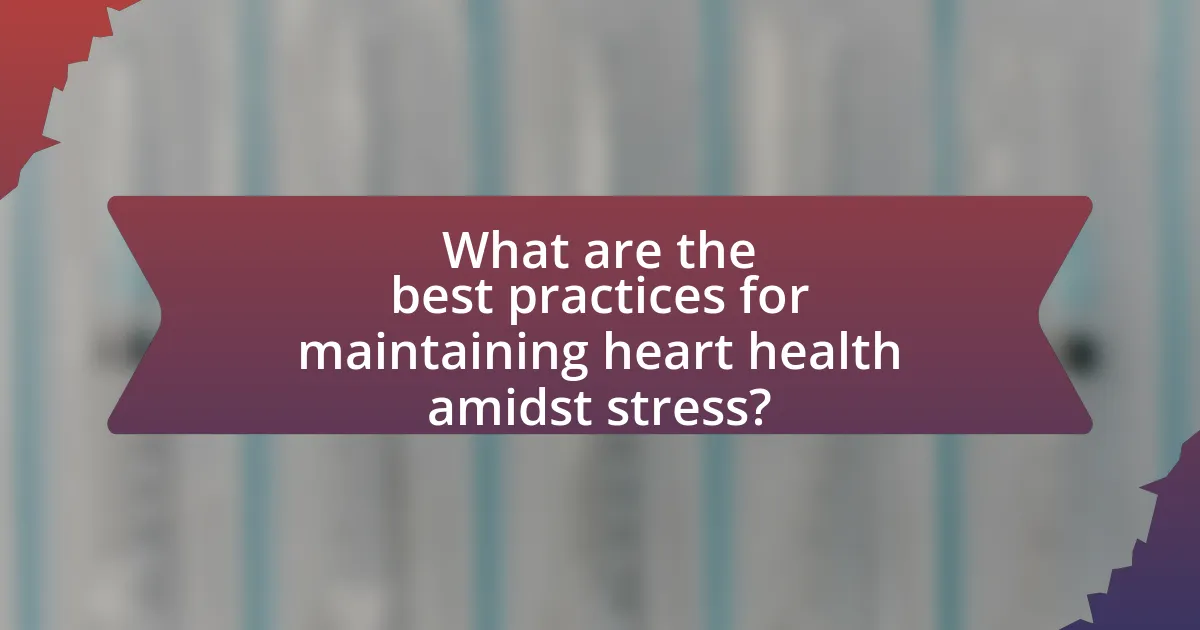
What are the best practices for maintaining heart health amidst stress?
To maintain heart health amidst stress, individuals should engage in regular physical activity, practice mindfulness techniques, and maintain a balanced diet. Regular exercise, such as aerobic activities, has been shown to reduce stress hormones and improve cardiovascular health by enhancing blood circulation and lowering blood pressure. Mindfulness practices, including meditation and deep-breathing exercises, can decrease stress levels and promote relaxation, which is beneficial for heart health. Additionally, a balanced diet rich in fruits, vegetables, whole grains, and healthy fats supports overall cardiovascular function and helps manage stress-related weight gain. Studies indicate that these practices collectively contribute to lower risks of heart disease and improved heart health outcomes.
How can regular health check-ups contribute to heart health management?
Regular health check-ups significantly contribute to heart health management by enabling early detection and intervention of cardiovascular issues. These check-ups typically include assessments of blood pressure, cholesterol levels, and other risk factors that can lead to heart disease. For instance, the American Heart Association states that regular monitoring can identify hypertension, which affects nearly half of adults in the U.S., allowing for timely lifestyle changes or medication to mitigate risks. Furthermore, check-ups facilitate discussions about stress management techniques, which are crucial since chronic stress is linked to heart health deterioration. By addressing both physical and psychological factors during these visits, healthcare providers can create comprehensive management plans that enhance overall heart health.
What screenings are essential for monitoring heart health in stressed individuals?
Essential screenings for monitoring heart health in stressed individuals include blood pressure measurement, cholesterol level assessment, and electrocardiograms (ECGs). Blood pressure measurement is crucial as stress can lead to hypertension, which is a significant risk factor for heart disease. Cholesterol level assessment helps identify dyslipidemia, often exacerbated by stress, which can contribute to atherosclerosis. Electrocardiograms provide insights into heart rhythm and can detect stress-induced changes in heart function. These screenings are vital for early detection and management of potential cardiovascular issues linked to stress.
How often should individuals with high stress levels consult a healthcare provider?
Individuals with high stress levels should consult a healthcare provider regularly, ideally every few months or as needed based on their symptoms. Regular consultations can help monitor stress-related health issues, as chronic stress is linked to conditions such as hypertension and heart disease. The American Psychological Association emphasizes that ongoing support and assessment can lead to better management of stress and its physical effects.
What role does sleep play in managing stress and heart health?
Sleep plays a crucial role in managing stress and maintaining heart health. Adequate sleep helps regulate cortisol levels, the hormone associated with stress, thereby reducing anxiety and promoting emotional stability. Research indicates that individuals who consistently get sufficient sleep experience lower blood pressure and improved cardiovascular function, which are essential for heart health. For instance, a study published in the Journal of Clinical Sleep Medicine found that people who sleep less than seven hours per night are at a higher risk of developing hypertension and heart disease. Thus, prioritizing quality sleep is vital for effective stress management and overall cardiovascular well-being.
How can improving sleep hygiene benefit heart health?
Improving sleep hygiene can significantly benefit heart health by reducing stress and lowering blood pressure. Quality sleep helps regulate hormones that control stress and inflammation, which are critical factors in cardiovascular health. Research indicates that individuals who maintain good sleep hygiene experience lower levels of cortisol, a stress hormone linked to heart disease. Additionally, a study published in the Journal of Clinical Sleep Medicine found that better sleep quality is associated with a reduced risk of hypertension and heart disease. Thus, prioritizing sleep hygiene is essential for maintaining a healthy heart.
What are the effects of sleep deprivation on stress and cardiovascular health?
Sleep deprivation significantly increases stress levels and negatively impacts cardiovascular health. Research indicates that inadequate sleep elevates cortisol, the stress hormone, leading to heightened anxiety and stress responses. Furthermore, chronic sleep deprivation is associated with increased risks of hypertension, heart disease, and stroke, as it disrupts the body’s ability to regulate blood pressure and inflammation. A study published in the Journal of the American College of Cardiology found that individuals with less than six hours of sleep per night had a 20% higher risk of developing cardiovascular disease compared to those who slept seven to eight hours. Thus, the effects of sleep deprivation on stress and cardiovascular health are profound and detrimental.
What practical tips can individuals implement to manage stress effectively?
Individuals can manage stress effectively by incorporating regular physical activity, practicing mindfulness techniques, and maintaining a balanced diet. Engaging in physical exercise, such as walking or yoga, has been shown to reduce stress hormones and improve mood through the release of endorphins. Mindfulness practices, including meditation and deep-breathing exercises, can enhance emotional regulation and decrease anxiety levels. Additionally, a balanced diet rich in fruits, vegetables, and whole grains supports overall health and can mitigate stress responses. Research indicates that these strategies not only improve mental well-being but also contribute to better heart health by lowering blood pressure and reducing the risk of cardiovascular diseases.
